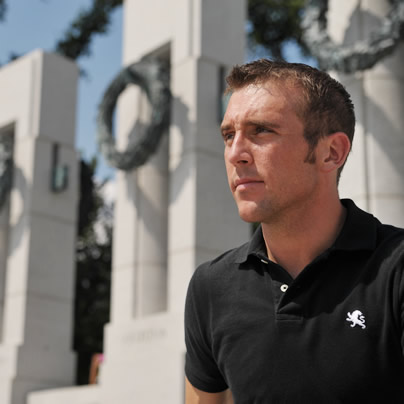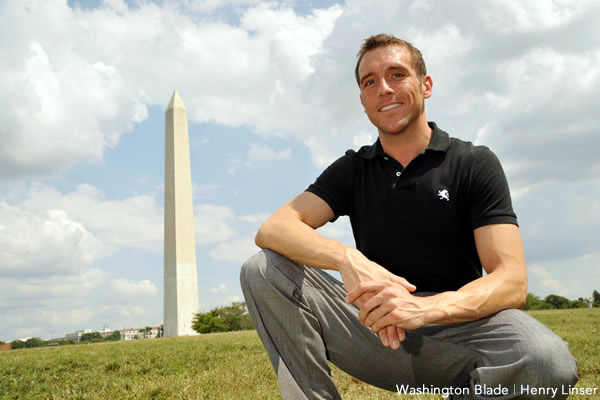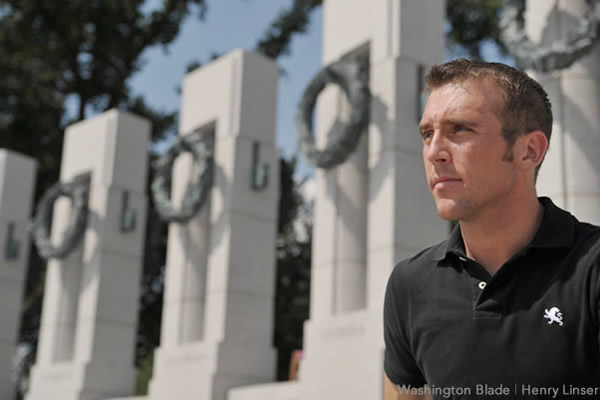National
Iraq war vet who fought ‘Don’t Ask’ dies in car accident
Manzella discharged under military’s gay ban after coming out on ’60 Minutes’


Darren Manzella, shown here in 2008, came out as gay while serving in the Army under “Don’t Ask, Don’t Tell.” He died at age 36. (Washington Blade file photo by Henry Linser).
A gay veteran of the Iraq war who fought against “Don’t Ask, Don’t Tell” has died in a car accident in Pittsford, N.Y.
Darren Manzella, who came out as gay in 2007 while serving in the Army during an interview on CBS’ “60 Minutes,” died on Thursday at the scene of the crash. He had just turned 36 on Aug. 8.
Steve Ralls, the former spokesperson for Servicemembers Legal Defense Network who handled his public relations at the time, said openly gay troops currently serving around the world today are able to do so, in part, because of Darren’s sacrifice.
“Darren knew he would be discharged for speaking out, but he volunteered to do it because he wanted the men and women who followed him to be able to serve openly without fear of discharge or discrimination,” Ralls said. “That’s the kind of guy, and the kind of soldier, Darren was. I know how deeply proud his family was of him, and that pride was shared by all of us who had the privilege of working with him, too.”
Manzella served as an Army medic in Kuwait and Iraq and earned a Combat Medical Badge for treating his fellow soldiers. His “60 Minutes” interview was filmed, in secret, in Kuwait City while he was still a Staff Sergeant in the Army.
He was the first openly gay service member on active duty to speak to the press from a war zone. Months after coming out publicly, Manzella was given an honorable discharge under the military’s gay ban in 2008.
Since August 2011, Manzella had been working as a health science specialist for the Department of Veterans Affairs in Rochester. According to his Facebook page, he very recently married his spouse, Javier Lapeira, on July 5.
Retired Air Force Lt. Col. Victor Fehrenbach, who also faced discharge under “Don’t Ask, Don’t Tell” for being gay, knew Manzella and said he was an inspiration.
“Darren Manzella wasn’t just a hero and an inspiration to me personally, he was an American hero and a civil rights leader,” Fehrenbach said. “When my ordeal started in May 2008, I saw Darren’s interview on 60 minutes. He inspired me to speak out and tell my story. He had such a great impact in the repeal of DADT.”
Fehrenbach, who was ultimately able to stay in the Air Force before he retired on his own volition, said his friend will leave a lasting legacy.
“The only blessing is that Darren died as a soldier and a husband,” Fehrenbach said. “He was able to fulfill his dreams to serve his country openly and marry the man he loved. I will miss him dearly, and I will never forget him. He made the world a better place and he made me better and stronger for knowing him.”
The Rochester-based Democrat and Chronicle quotes Michael Manzella, Darren’s father, as identifying his son as a person who was killed in the accident Thursday night.
Michael Manzella reportedly said Darren was struck by a sport utility vehicle while pushing his car that was already damaged in an accident that happened immediately beforehand on Interstate 490. Michael Manzella is quoted as saying as of Friday afternoon, his calls to police so far haven’t been returned.
In the same report, Cpl. John Helfer of the Monroe County Sheriff’s Office reportedly confirmed an accident involving two collisions took place on Thursday that caused someone’s death. However, Helfer reportedly wouldn’t name the person.
Helfer reportedly said the incident began as a two-car crash on the westbound lanes of the highway in Pittsford, when one car sideswiped another car about 8:30 p.m. The man in the struck car stopped in the middle lane of I-490, got out and started pushing it from behind, Helfer was quoted as saying.
But a sport utility vehicle rear-ended the car, pinning the man between the two vehicles. The man was pronounced dead at the scene, Helfer reportedly said. The other two involved drivers were reportedly taken to Strong Memorial Hospital with minor injuries.
Lapeira told the Blade the police came to his apartment to notify him that they had found Manzella’s car and his body, which remained at the Medical Examiner in Rochester until Saturday.
“Needless to say, Darren was a hero in every sense of the word,” Lapeira said. “Even at the moment of his death, his first instinct was to push his car off the freeway to avoid any injuries to others.”
After coming out on “60 Minutes,” Manzella was discharged months later under the military’s gay ban known as “Don’t Ask, Don’t Tell.” President Obama signed legislation to repeal that law in December 2010 and lifted the ban the following year.
In January 2008, the Washington Blade published an article — the first byline in the paper for this reporter — on Manzella’s appearance on “60 Minutes” during a period of uncertainty on whether he’d be expelled from the military. After he was subsequently kicked out of the Army under “Don’t Ask, Don’t Tell,” the Blade followed up in July 2008 with an article on his experience.
At the time, the former soldier told the Blade during his discharge proceedings he had the opportunity to request a board to rebut statements that he made to the press. But Manzella waved this option.
“I said I wouldn’t take back anything,” he said. “It would defeat the purpose of why I participated in the [“60 Minutes”] segment. It would defeat the purpose of working with SLDN.”
The former soldier told the Blade experience of being out in the military, making media appearances and ultimately being discharged from service has made him “much more aware” of his identity.
“My belief that ‘Don’t Ask, Don’t Tell’ needs to be repealed has magnified significantly because I’m personally affected by it now,” he said.

Darren Manzella in 2008. (Washington Blade file photo by Henry Linser)

The Comings & Goings column is about sharing the professional successes of our community. We want to recognize those landing new jobs, new clients for their business, joining boards of organizations and other achievements. Please share your successes with us at [email protected].
Congratulations to Gil Pontes III on his recent appointment to the Financial Advisory Board for the City of Wilton Manors, Fla. Upon being appointed he said, “I’m honored to join the Financial Advisory Board for the City of Wilton Manors at such an important moment for our community. In my role as Executive Director of the NextGen Chamber of Commerce, I spend much of my time focused on economic growth, fiscal sustainability, and the long-term competitiveness of emerging business leaders. I look forward to bringing that perspective to Wilton Manors — helping ensure responsible stewardship of public resources while supporting a vibrant, inclusive local economy.”
Pontes is a nonprofit executive with years of development, operations, budget, management, and strategic planning experience in 501(c)(3), 501(c)(4), and political organizations. Pontes is currently executive director of NextGen, Chamber of Commerce. NextGen Chamber’s mission is to “empower emerging business leaders by generating insights, encouraging engagement, and nurturing leadership development to shape the future economy.” Prior to that he served as managing director of The Nora Project, and director of development also at The Nora Project. He has held a number of other positions including Major Gifts Officer, Thundermist Health Center, and has worked in both real estate and banking including as Business Solutions Adviser, Ironwood Financial. For three years he was a Selectman, Town of Berkley, Mass. In that role, he managed HR and general governance for town government. There were 200+ staff and 6,500 constituents. He balanced a $20,000,000 budget annually, established an Economic Development Committee, and hired the first town administrator.
Pontes earned his bachelor’s degree in political science from the University of Massachusetts, Dartmouth.
Kansas
ACLU sues Kansas over law invalidating trans residents’ IDs
A new Kansas bill requires transgender residents to have their driver’s licenses reflect their sex assigned at birth, invalidating current licenses.

Transgender people across Kansas received letters in the mail on Wednesday demanding the immediate surrender of their driver’s licenses following passage of one of the harshest transgender bathroom bans in the nation. Now the American Civil Liberties Union is filing a lawsuit to block the ban and protect transgender residents from what advocates describe as “sweeping” and “punitive” consequences.
Independent journalist Erin Reed broke the story Wednesday after lawmakers approved House Substitute for Senate Bill 244. In her reporting, Reed included a photo of the letter sent to transgender Kansans, requiring them to obtain a driver’s license that reflects their sex assigned at birth rather than the gender with which they identify.
According to the reporting, transgender Kansans must surrender their driver’s licenses and that their current credentials — regardless of expiration date — will be considered invalid upon the law’s publication. The move effectively nullifies previously issued identification documents, creating immediate uncertainty for those impacted.
House Substitute for Senate Bill 244 also stipulates that any transgender person caught driving without a valid license could face a class B misdemeanor, punishable by up to six months in jail and a $1,000 fine. That potential penalty adds a criminal dimension to what began as an administrative action. It also compounds the legal risks for transgender Kansans, as the state already requires county jails to house inmates according to sex assigned at birth — a policy that advocates say can place transgender detainees at heightened risk.
Beyond identification issues, SB 244 not only bans transgender people from using restrooms that match their gender identity in government buildings — including libraries, courthouses, state parks, hospitals, and interstate rest stops — with the possibility for criminal penalties, but also allows for what critics have described as a “bathroom bounty hunter” provision. The measure permits anyone who encounters a transgender person in a restroom — including potentially in private businesses — to sue them for large sums of money, dramatically expanding the scope of enforcement beyond government authorities.
The lawsuit challenging SB 244 was filed today in the District Court of Douglas County on behalf of anonymous plaintiffs Daniel Doe and Matthew Moe by the American Civil Liberties Union, the ACLU of Kansas, and Ballard Spahr LLP. The complaint argues that SB 244 violates the Kansas Constitution’s protections for personal autonomy, privacy, equality under the law, due process, and freedom of speech.
Additionally, the American Civil Liberties Union filed a temporary restraining order on behalf of the anonymous plaintiffs, arguing that the order — followed by a temporary injunction — is necessary to prevent the “irreparable harm” that would result from SB 244.
State Rep. Abi Boatman, a Wichita Democrat and the only transgender member of the Kansas Legislature, told the Kansas City Star on Wednesday that “persecution is the point.”
“This legislation is a direct attack on the dignity and humanity of transgender Kansans,” said Monica Bennett, legal director of the ACLU of Kansas. “It undermines our state’s strong constitutional protections against government overreach and persecution.”
“SB 244 is a cruel and craven threat to public safety all in the name of fostering fear, division, and paranoia,” said Harper Seldin, senior staff attorney for the ACLU’s LGBTQ & HIV Rights Project. “The invalidation of state-issued IDs threatens to out transgender people against their will every time they apply for a job, rent an apartment, or interact with police. Taken as a whole, SB 244 is a transparent attempt to deny transgender people autonomy over their own identities and push them out of public life altogether.”
“SB 244 presents a state-sanctioned attack on transgender people aimed at silencing, dehumanizing, and alienating Kansans whose gender identity does not conform to the state legislature’s preferences,” said Heather St. Clair, a Ballard Spahr litigator working on the case. “Ballard Spahr is committed to standing with the ACLU and the plaintiffs in fighting on behalf of transgender Kansans for a remedy against the injustices presented by SB 244, and is dedicated to protecting the constitutional rights jeopardized by this new law.”
National
After layoffs at Advocate, parent company acquires ‘Them’ from Conde Nast
Top editorial staff let go last week

Former staff members at the Advocate and Out magazines revealed that parent company Equalpride laid off a number of employees late last week.
Those let go included Advocate editor-in-chief Alex Cooper, Pride.com editor-in-chief Rachel Shatto, brand partnerships manager Erin Manley, community editor Marie-Adélina de la Ferriére, and Out magazine staff writers Moises Mendez and Bernardo Sim, according to a report in Hollywood Reporter.
Cooper, who joined the company in 2021, posted to social media that, “Few people have had the privilege of leading this legendary LGBTQ+ news outlet, and I’m deeply honored to have been one of them. To my team: thank you for the last four years. You’ve been the best. For those also affected today, please let me know how I can support you.”
The Advocate’s PR firm when reached by the Blade said it no longer represents the company. Emails to the Advocate went unanswered.
Equalpride on Friday announced it acquired “Them,” a digital LGBTQ outlet founded in 2017 by Conde Nast.
“Equalpride exists to elevate, celebrate and protect LGBTQ+ storytelling at scale,” Equalpride CEO Mark Berryhill said according to Hollywood Reporter. “By combining the strengths of our brands with this respected digital platform, we’re creating a unified ecosystem that delivers even more impact for our audiences, advertisers, and community partners.”
It’s not clear if “Them” staff would take over editorial responsibilities for the Advocate and Out.
-

 Federal Government5 days ago
Federal Government5 days agoTwo very different views of the State of the Union
-

 Virginia5 days ago
Virginia5 days agoVa. activists preparing campaign in support of repealing marriage amendment
-

 Opinions4 days ago
Opinions4 days agoThe global cost of Trump’s foreign aid ideology
-

 Opinions3 days ago
Opinions3 days agoCriteria for supporting a candidate in D.C.
















